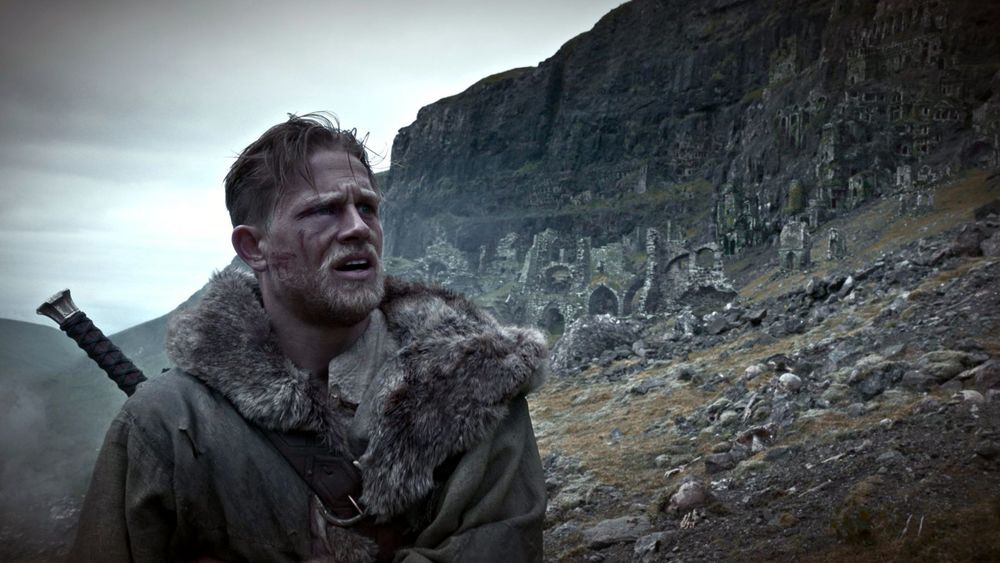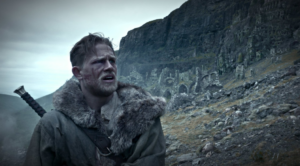A 100-foot tall elephant sweeps its tusk across the ground, destroying the unfortunate souls in its way. It crashes through a bridge, allowing the soldiers on its back to disembark and battle with their enemies. The beast is evidently under the control of the evil “mage” Mordred, who is determined to destroy Camelot, for reasons that are not quite clear. The best part? This all occurs in the first two minutes of the film. At this point, if you’re not hooked in by the sheer absurdity of the proceedings on the screen, odds are you will not like the rest of what King Arthur: Legend of the Sword has to offer. It is a uniquely deranged experience that revels in its indulgence of the ridiculous, and rewards the viewer who enjoys the film for exactly what it is.
In fact, the first ten minutes are a microcosm of everything King Arthur has to offer. It starts with Arthur’s father, Uther Pendragon (Erica Bana) defeating the aforementioned elephant-wielding mage Mordred in a rousing battle. Uther’s brother, the wonderfully over-the-top Vortigern (Jude Law, giving the performance of a lifetime), then betrays Uther and kills him, but not before Uther is able to send his baby son, the eponymous Arthur, down a river to safety and a new life. The betrayal is sloppily executed: the viewer does not understand Vortigern’s motivations until later in the story, and the transition from epic battle to sudden betrayal feels rushed and its impact is not felt at all. The opening battle scene is outstanding, but it is undermined by a sudden plot twist right afterwards, as the audience barely knows or cares about the characters.
The rest of the film is rife with confusingly edited moments interspersed throughout exciting and gripping set-pieces, along with some excellent direction from Guy Ritchie. This gives the film a wildly inconsistent quality: at one moment, the viewer is enjoying some of Ritchie’s trademark character banter and quick editing, the next, the characters are rushing from plot point to plot point, trying to follow the film’s extremely convoluted and condensed worldbuilding. It’s as if Ritchie was asked to only direct parts of the film, while the other parts were just filled in by CGI and generic camerawork. Fortunately though, when Ritchie’s style is evident, the film is incredibly entertaining. His hyperactive editing does an excellent job of conveying exposition to the audience without the need for dialogue, and when there is dialogue, Ritchie keeps the pace moving so that the film never drags. Of the many potential criticisms of King Arthur, having a boring pace is not one of them.
Fortunately for the film, the cast nails their roles, which is an achievement given the ridiculous nature of the story. Charlie Hunnam is a decent, if slightly bland king, the aforementioned Jude Law steals every scene he’s in, and the rest is filled out by a couple of very colorful characters. Djimon Hounsou and Aidan Gillen are both particular delights, although a bizarre David Beckham cameo is a little too distracting. The actors are helped out by the frenetic editing and Ritchie’s fast-paced camerawork. However, where the film falls very short is in its depiction of Astrid Bergès-Frisbey’s character. Bergès-Frisbey plays a mysterious female mage who helps Arthur in his quest to claim the throne. The film hints at a deeper relationship between the two, but this storyline ultimately goes nowhere. The character certainly deserves more development, but the extent of her character arc is that she takes the form of a giant snake during the final battle. It can’t help but feel like a missed opportunity to create an interesting female role, but then again, Ritchie does not seem overly concerned with character development.
Daniel Pemberton’s score is also sublime. Pemberton channels his inner Hans Zimmer with blaring loud horns, but he also mixes in a variety of other instruments to create a very memorable soundtrack to the film. A few vocalists are incorporated into the soundtrack, and although the singing seems a little overwrought at times, it never interferes too much with the action on screen to be anything more than a minor addition. The exciting score meshes perfectly with Ritchie’s directing style, creating an excellent balance between the composer and director.
In many ways, King Arthur has everything a summer blockbuster should have: giant CGI monsters, Shakespearean family drama, and great set-pieces backed up by a fantastic score. Ritchie holds nothing back, which creates an over-the-top style that hinders the film at times, and liberates it at others. King Arthur isn’t trying to wow critics or create a medieval masterpiece. If the viewer approaches the film as two hours of wild fun, then King Arthur will be an absolute blast. If anything more is desired, then the king will not rule after all.





